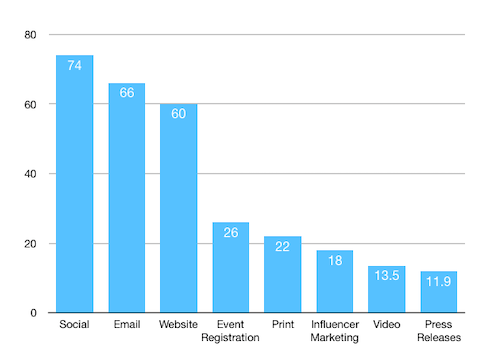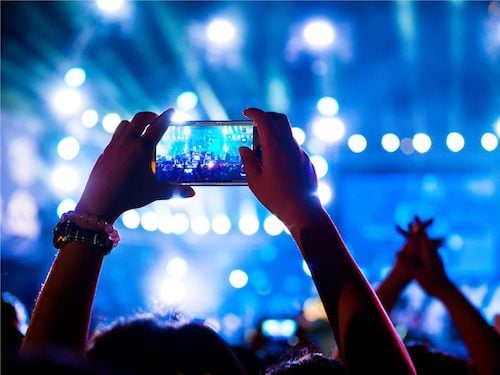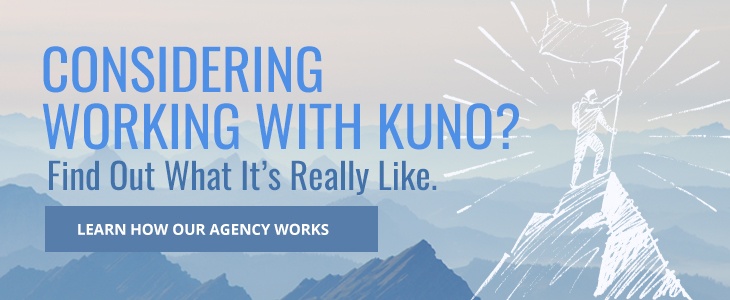
12 Ways to Incorporate Digital Marketing Into Your Event Planning

It may be a new year, but event planners are dealing with the same old problems. Budgeting issues, understaffing, low attendee engagement ... the list goes on. And now, I’m telling you to invest more funds and resources into your digital marketing strategy. The nerve. Here’s the thing: When you do digital marketing right, it can actually make your eventful life easier.
Behold, the most straightforward rundown of must-do digital marketing activities! Compare our list with your current strategy and earn some pro tips along the way.
12 Digital Marketing Tips for Your Event Planning
Before the Event
As you build momentum, anticipation, and followers — keep in mind — follow-through is everything. Catfishing attendees with a false representation of what they can expect will backfire.
1. Define Key Data Points
According to Skift, Inc., 55% of event professionals believe they don’t measure the success of their events well enough, 18% believe they measure their event success accurately and 10% feel they measure it in great detail.
Many event planning teams attempt to collect too much data, which convolutes their ability to draw meaningful insights and worse, puts them at risk for non-compliance with General Data Protection Regulations (GDPR). To narrow down data aggregation efforts, define the following:
- What data do you need to plan a successful event?
- What data does your leadership team want?
- How will you collect the right data points?
Skift, Inc. reports that event planners listed social media as the most effective tool for event marketing (74%), followed by email marketing (66%), their website (60%), and the event registration site (26%).

2. Optimize Your Website
Beyond common-sense branding, your website should provide an exceptional mobile experience and resources that encourage attendees to engage — for example, online registration and payment capabilities, interactive maps, up-to-the-minute event updates, surveys, and vendor or attendee support tools like chatbots.
3. Strategize Your Social Media Activity
Begin with an audit of your profiles. Maintain consistent branding across all channels and update information, images, and banners. Next, create an event page.
According to Eventbrite, 96% of event planners use social media contests and consider it an effective strategy. You could incentivize registration with a contest or promotion.
- Consider social advertising (target people who have interacted with your current or previous events, or use demographics to target a specific industry or populous)
- Create an event hashtag and encourage followers to use it
- Tease exciting details, such as high-profile speakers
4. Leverage Influencers to Promote
“63% of event creators use influencer marketing as part of their social strategy.” – Eventbrite
From well-known speakers to industry-leading sponsors, your event partnerships are an important asset that can connect you with new audiences. Use them! The key is to make promoting the event as quick and easy as possible. Create a media kit and distribute it to your speakers, vendors, and sponsors. Urge them to use branded content and imagery via their personal social media channels.

Pro Tip: Ask the keynote speaker to talk about the event online or, better yet, record a quick video inviting their followers to register for the event.
5. Up Your Email Marketing Game
“78% of event creators say email marketing is their most effective marketing tactic. For those who track it, 45% of event ticket sales can be attributed to email.” – Eventbrite
There are several ways to step up your email marketing game. One of the most effective ways is to test different subject lines. About 41 characters or 7 words in length seems to be the sweet spot. Personalization is mandatory.
Create a sense of urgency:
- “Last Call. Tickets are selling fast!”
- “Discount tickets, today only!”
Evoke an emotional reaction:
- “We need your support, [name]”
- “[name], you can make a difference.”
Make an intriguing announcement:
- “Guess who we landed as guest speaker?!”
- “Did you hear the big news?”
Pro Tip: Have all employees use a branded email signature that promotes the event. A visual call-to-action as your email signature can be a powerful conversion tool.
6. Create & Distribute Video Content
Video marketing is the best way to captivate audiences. Here are some ideas to inspire your video production strategy:
- Give a behind-the-scenes peek at set-up for the event
- Conduct on-screen interviews with speakers or special guests to tease the event
- Create a ramp-up video that inspires audiences through the art of emotional storytelling
- Don’t forget to save all video footage for use after the event (e.g., event recaps, promos for next year’s event, etc.)
During the Event

7. Create a Sense of Fear of Missing Out (FOMO)
When the event kicks off, it can be easy to forget digital audiences, but just because they didn’t choose to attend an event in person doesn’t mean you won’t gain their support in the future. Incite a sense of FOMO by live streaming coverage of the event.
“67% of viewers are more likely to buy a ticket to an event [or one similar] after watching a live video.” – Eventbrite
8. Live Blog
Give your digital audience exclusive details by live blogging as the event unfolds. The trick is to use Twitter to get digital audiences talking, asking questions, and engaging with events in real-time.
Pro Tip: As you capture and distribute video and written content, don’t forget to promote the event hashtag. You should also encourage attendees to post pictures using the event hashtag to increase traction.
9. Use Live Social Interaction to Extend Reach
Now is not the time to abandon your social media strategy. Plan to post on all channels periodically throughout the day, including:
- Pictures of the event space, attendees, special guests, etc.
- Statistics about the event
- Time-lapse video of attendee traffic flow or event set-up
If attendees are featured in a photo or video, ask permission to tag the individuals on social media to reach new audiences.
10. Don’t Lose Sight of Interactivity
One of your chief goals is to start a two-way conversation with audience members. In other words, don’t just post and talk at them. Comment, like, share, and interact with their content and commentary on the event.
After the Event
12. Learn from the Experience
“Only 16% of event planners feel they are on top of their data reporting and analysis -- and 84% have trouble managing and analyzing the data they are able to capture.” – Forbes
Post-event digital marketing is what separates the weak from the strong. Unfortunately, the vast majority of event professionals don’t know how to process the data they’ve collected to enhance post-event marketing capabilities or future event planning. Narrowing the scope of data collected will help (see point No.1). Additionally, you should use attendee data and analytics to:
- Improve targeted promotions—for example, you may discover that most of your attendees came from a specific social media channel. Knowing this, you can pull ad dollars from a less effective source and increase spending on that channel.
- Understand your audiences’ preferences better. Machine learning can help collect information from their online interactions to glean insights, such as what their pain points were, which speakers they enjoyed most, what sessions earned the most attention, etc.
- Collect contact and demographic information about each attendee and use this data to personalize post-event and future event digital marketing outreach.
- Improve the attendee experience. Compare before and after surveys, monitor traffic flow, and consider how attendees interacted with the event space and event activities. Use findings to crowd shape and decrease bottlenecks, adjust the timing of events, or create unique offerings like 5G-enabled workspaces.
Use The End as a New Beginning
Digital marketers are always looking for reasons to directly interact with audience members. Showing gratitude is a fantastic segue into your ongoing relationship with attendees. More than anything, people want a highly personalized experience. So prepare to put data into action right away as you develop email campaigns. In addition to thanking your attendees, recapping the event highlights, and making final announcements, foster a community around your cause with an inspiring call-to-action.
The most successful event planners know when to delegate. If these activities feel overwhelming to you, consider partnering with a digital marketing agency. The right agency partnership will ensure that your event planning team implements proven digital strategies to bolster attendance and engagement. By outsourcing digital marketing activities to the experts, event planners can also maximize limited budgets and resources, thereby alleviating many of the top challenges keeping them from achieving their goals.






